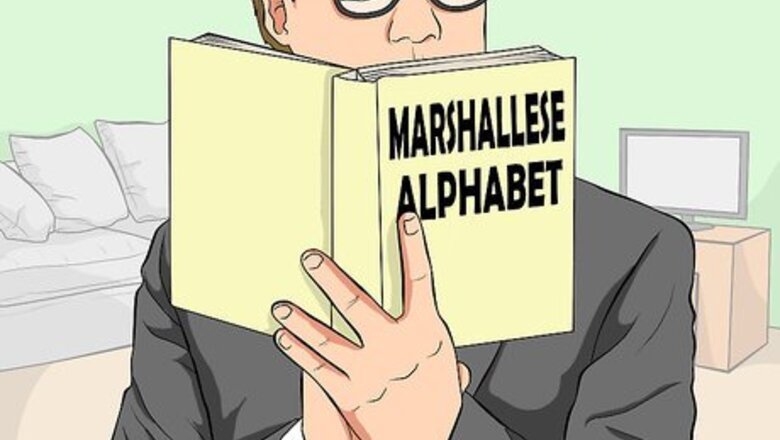
views
Learn the basics
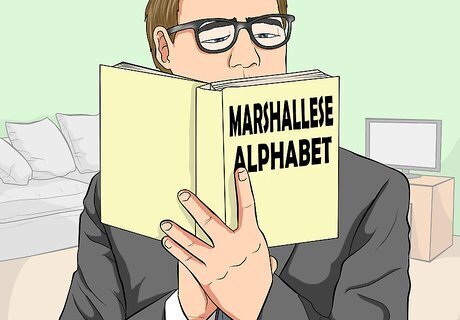
Learn the Marshallese alphabet. Although the Marshallese alphabet is almost identical to Spanish or English in terms of some of the letters used, the pronunciation of each letter is significantly different. As correct pronunciation is one of the most difficult skills for English learners of Marshallese to grasp, learning how to perfectly pronounce the letters of the alphabet is a great place to start your Marshallese-speaking adventure! Once you can pronounce all of the individual letters, learning how to pronounce entire words and phrases will be a lot easier. Below is a list of the letters and what they are called. Notice that some of the letters have a macron (bar on top) or a dot/cedille (squigilly or dot underneath). These symbols give these letters a different sound that is sometimes imperceptible for non-native speakers but that make a difference in Marshallese. A a = ah Ā ā = aeh B b = bee D d = dree E e = eh I i = ee J j = jay, say, shay, chay K k = kee L l = lee Ḷ ḷ = lee (like 'L' but with the toungue touching the ridge behind the teeth) M m = mee Ṃ ṃ = mwee N n = nee Ṇ ṇ = nee (like 'N' but with the toungue pulled back) Ñ ñ = ngee O o = oh Ọ ọ = oa (like 'oa' in 'boat') Ō ō = oo (like 'oo' in 'book') P p = pea R r = ree (rolled like in Spanish) T t = tee U u = oo (like 'oo' in 'boo') Ū ū = oo (like 'oo' in 'book') W w = wee
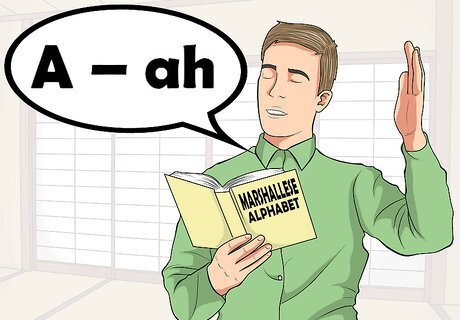
Learn to pronounce words. Once you learn to pronunce the letters of the Marshallese alphabet, you'll be able to pronunce any word you see in the Marshallese-English Online Dictionary and you'll be on your way to instinctively knowing how to spell words you hear.Practice the special pronunciation of letters with macrons and cedillas ā is pronounced like you're trying to say the 'e' in 'pet and the 'a' in 'pat' at the same time ō sounds like the 'oo' in 'book' ọ sounds like the 'o' in 'pot' ū is pronounced halfway between the 'ea' in 'beat' and the 'oo' in 'boot' ḷ sounds like 'L' but is pronounced with the toungue touching the ridge behind the teeth ṃ sounds like the 'M' but with the lips rounded ñ sounds like the 'ng' in 'singer' ṇ sounds like 'N' but with the toungue pulled back
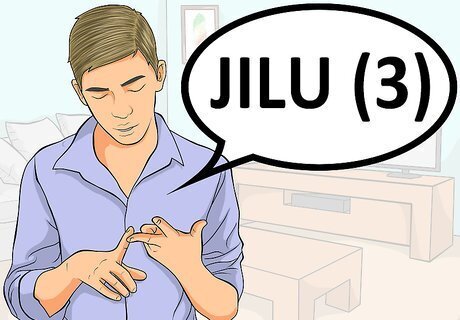
Learn to count. Knowing how to count is an essential skill in any language. Learning to count in Marshallese is not too tricky. Numbers one through ten are listed below: 1 = Juon 2 = Ruo 3 = Jilu 4 = Emān 5 = Ḷalem 6 = Jijino 7 = Jimjuon 8 = Ralitōk 9 = Ratimjuon 10 = Joñoul
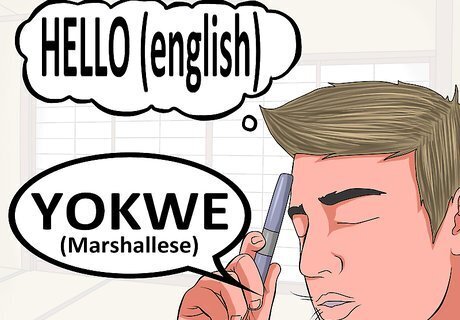
Memorize simple vocabulary. The wider the vocabulary you have at your disposal, the easier it is to speak a language fluently. Familiarize yourself with as many simple, everyday Marshallese words as possible - you'll be surprised at how quickly they build up! One of the easiest ways to do this is to use cognates - these are words that share a similar meaning, vary slightly spelling and pronunciation in both languages. Learning Marshallese cognates of English words is a great way to rapidly increase your vocabulary, but you must be careful since the pronunciation of these words may be different in Marshallese and it may be hard to pick them out in a sentence. For words without cognates, try using one of the following memorization methods: When you hear a word in English, think about how you would say it in Marshallese. If you don't know what it is, jot it down and look it up later. It's handy to keep a little notebook on you at all times for this purpose. Alternatively, try attaching little Marshallese labels to items around your house, such as the mirror, the coffee table and the sugar bowl. You'll see the words so often that you'll learn them without realizing it! It is important to learn a word or phrase from ‘Marshallese to English’ as well as ‘English to Marshallese.’ That way you will remember how to say it, not just recognize it when you hear it.
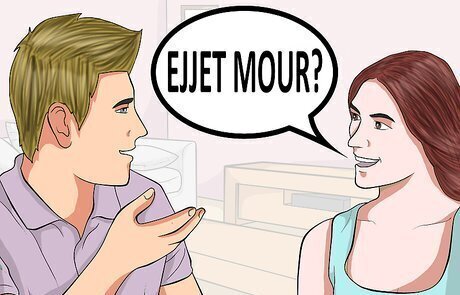
Learn some basic conversational phrases. By learning the basics of polite conversation, you'll very quickly be able to interact with Marshallese-speakers on a simple level. Jot down some everyday Marshallese phrases in a notebook and make a point of learning between five and ten of them each day. Here's a few to get you started: Hello! = Iakwe Yes = Aet No = Jab Thank you! = Koṃṃool! Please = Jouj What is your name? = Etaṃ? My name is... = Eta in... How are you? = Ejjet mour? Good. = Eṃṃan. See you later! = Bar loe eok!
Use online tools
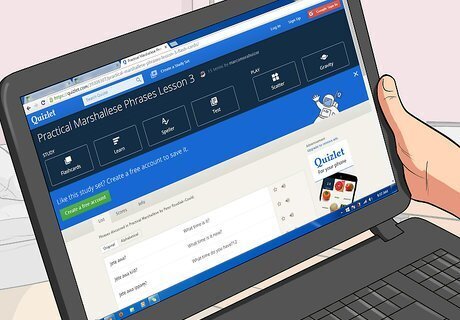
Read and use Practical Marshallese by Peter Rudiak-Gould. This book was originally written for the WorldTeach Marshall islands program for use by its volunteers. It can be freely distributed to anyone in any form. It introduces Marshallese to the beginner. It is organized into 102 two-page lessons, each with a main grammar point and a vocabulary section. There are also Marshallese dialogues, general tips, and pronunciation practice in many of the lessons. Each lesson is designed to be a manageable chunk of new material that could be learned in one sitting.
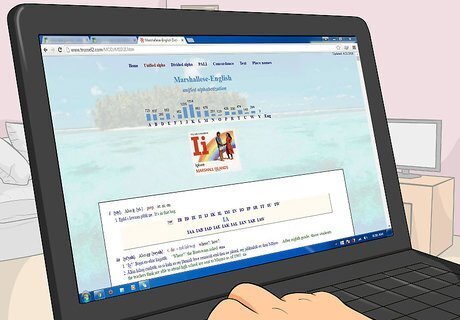
Use the Marshallese-English Online Dictionary to look up words you don't know. The Marshallese-English Online Dictionary is the most complete Marshallese dictionary and it is the standard for spelling in Marshallese. Apart from English definitions and word variants, it also includes example sentences that show how words are used in sentences.
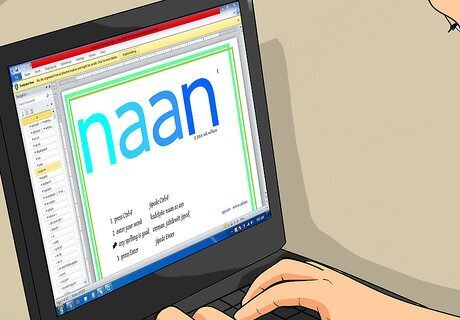
Download and learn to use the Naan Dictionary. This is smaller dictionary more fit for a beginner. It can be downloaded as a searchable Word file and printed. The advantage of this dictionary is that it comes with spelling variants (unlike the MEOD) which can help you find words as they are spelled by many Marshallese. If you use it on your computer, you can search for words.
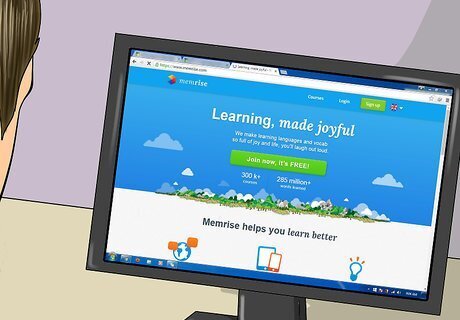
Use Memrise to practice basic Marshallese vocabulary. Memrise is an online platform where people make language-learning courses. There are a few courses for learning and practicing written Marshallese.
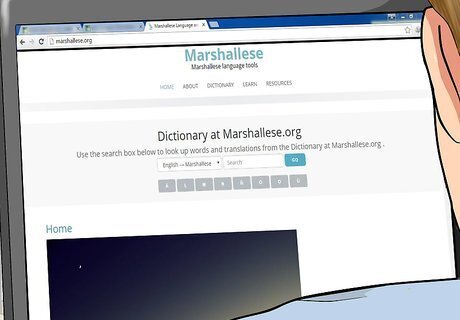
Use the example dictionary at Marshallese.org. Marshallese.org is an online example dictionary that shows example sentences for words in English and Marshallese. Since Google Translate doesn't support Marshallese yet, this is the next best thing. It's purpose is not to provide translations of sentences but to show how specific words have been translated in the past by human translators.










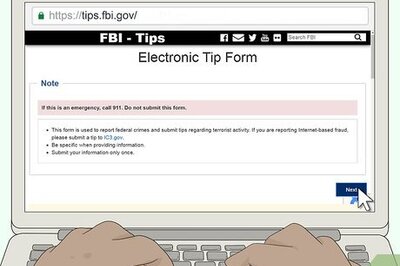


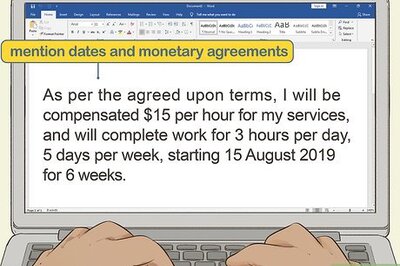



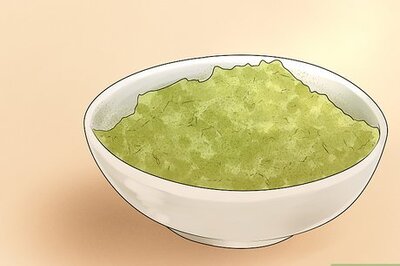
Comments
0 comment